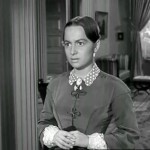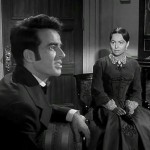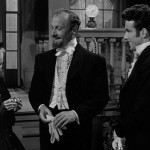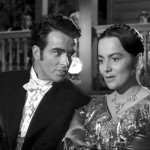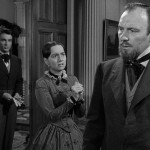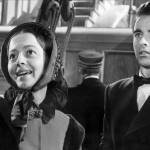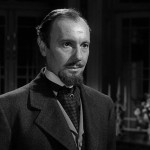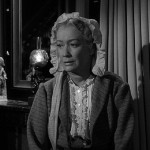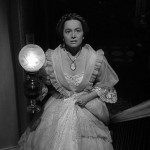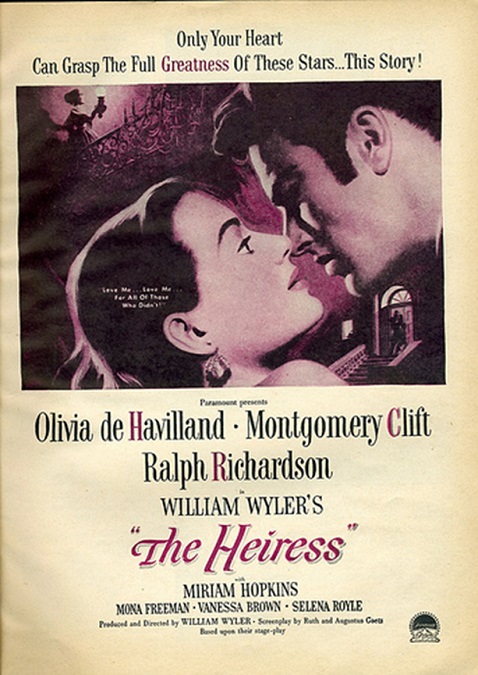
The Heiress – 1949
This was a movie with a simple plot, but good character development. I know it was effective with me. Olivia de Havilland played the lead, Catherine Sloper, the only daughter of wealthy doctor, Austin, wonderfully played by Ralph Richardson.
Catherine is painfully plain and shy and her father makes no secret of his extreme disappointment in her. Enter Morris Townsend, played by Montgomery Clift. He is a young man who lavishes attention on her, but is apparently only interested in her inheritance. They plan to marry, but when he learns that her father will disinherit her if she marries him, Morris disappears, proving to her that he never loved her. Catherine turns bitter and is mean to everybody. She ends up happy at her father’s death, and though she still loves Morris, she spurns him and resigns herself to being an old maid.
Of course, it is much more subtle and complex than that, but those are the bare bones. There are a few little sub-plots that crop up along the way, but nothing terribly interesting. Now, all that being said, I actually liked the film. There were some excellent performances and the costumes and sets were wonderful. And I must also say that William Wyler’s directing was spot-on.
One scene, in particular, caught my attention as being well done. It was the scene in which Catherine is waiting for Morris to arrive and take her away. In the middle of the night, she comes to the parlor with her bags packed and her cloak on. Her Aunt, Lavinia, played by Miriam Hopkins, wakes and is dismayed when she learns that Catherine told Morris that she would not accept her inheritance. Aunt Lavinia knows that he will not return for her, and so she waits up with Catherine.
The scene was well done because de Havilland portrayed the nervous excitement of the character so well. And the let-down, when the hour of his arrival comes and goes without a sign of him, her break-down into tears was heart-breaking to watch. She finally realizes that her father had been right. He only wanted her money. And then, after that, her sad, sad walk of shame back to her room really pulled at my heart-strings.
After that, her character did a quick about-face. I mean, in the beginning, she was young and innocent and looked at the world through rose-tinted lenses. But after the betrayal, she became mean to her father for never loving her for who she was, and mean to Morris for breaking her heart. But she was also mean to her Aunt for seeing was happening and not doing anything to stop it, and mean to her housemaid because… well, because by that time she was just a mean and bitter woman.
Now, I would be remiss if I did not spend some time on Ralph Richardson’s fantastic performance. Apparently, he originated the role in the London production of the stage play. It was clear that he understood the character. He loved his daughter, but he loved her dead mother even more. He idealized his wife so much that Catherine could never hope to measure up. And when it came down to it, he seemed to care about what would happen to his fortune than his daughter’s happiness. The character could have so easily been very two-dimensional, but Richardson brought a passion to the role that gave it subtlety and direction.
Another honorable mention has to go to Miriam Hopkins. As the widowed Aunt, and a woman living in the early 1800’s, her desire to have Catherine marry was understandable, but she seemed to think that having a husband, any husband at all would be preferable to being alone, even if it was a loveless marriage. And it also came out that she didn’t really think Catherine capable of catching any man without her inheritance. So, she was just as bad as the rest, even though she was fighting to keep her niece’s romance with Morris alive. Hopkins did a fine job.
And lastly, I have to say something about Montgomery Clift. He was handsome enough, but I didn’t feel his acting skills was on par with the rest of his co-stars. I can’t put my finger on exactly why, but he seemed a little lack-luster next to the rest of the cast. Whether it makes a difference or not, it is interesting to note that the character of Morris was lightened for the film. In the original stage play he was apparently a much darker character, but at the time, Clift was popular with Paramount as a leading man. They didn’t want to tarnish his image too much by having him play such a bad-guy.
I would say that the film was average. It was good but not great. In the Best Picture category, it was up against All the King’s men, Battleground, A Letter to Three Wives and Twelve O’clock High, so I think it was appropriate that it didn’t win. However, de Havilland did win the Oscar for Best Actress that year. And though Aaron Copeland, a classical composer with a very distinct style, won for Best Original Score, the music didn’t really stand out for me.
